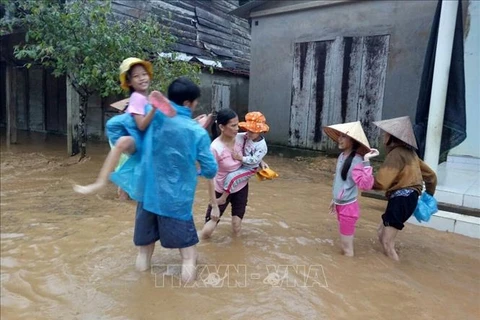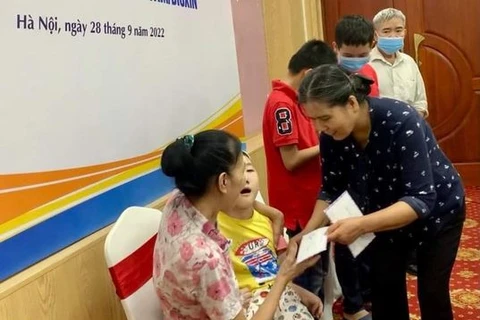Hanoi (VNA) - A Child Rights and Business Forum was organised in Hanoi on May 30 by UNICEF Vietnam and the Vietnam Chamber of Commerce and Industry (VCCI), emphasising the need for responsible business practices that respect child rights and prevent adverse human rights impacts.
“Children are both the present and the future, and business practices cannot be sustainable if they do not account for their impact on children”, said Rana Flowers, Representative of UNICEF in Vietnam.
“It requires children to be a key consideration in Environmental, Social, and Governance (ESG) assessments – where impacts and risks are assessed objectively, and key practices identified that can minimise those risks and create a positive impact for children. It will improve competitiveness and sustainability, it will win the support of stakeholders, especially investors, who are socially conscious and looking at ESG risks and how businesses are managing them”.
Vietnam is increasingly involved in the global supply chain and more rigorously integrated into the global economy. The country has signed over 15 trade agreements and has reaffirmed its commitment to respecting international fundamental principles and rights in the workplace.
Vietnam is in the process of developing a National Action Plan (NAP) to improve laws and policies to advance responsible business practices for the period of 2023-2027. The draft NAP adopts the United Nations Guiding Principles on Business and Human Rights (UNGPs), ensuring that all business practices, that ESG requirements are underpinned by clear human rights commitments.
At the forum, participants agreed that greater attention and distinctive measures should be included in the NAP to ensure the prevention and mitigation of adverse impacts and accelerating outcomes for children in health, nutrition, education, and water, sanitation and hygiene.
"The Child Rights and Business Forum is a critical event that aims to promote responsible business practices and supports the rights and well-being of children in Vietnam," said VCCI Vice Chairman Nguyen Quang Vinh.
"Prioritising the practice of ESG not only helps domestic businesses meet international standards, but also equips them with the ability to enter the global market. This, in turn, promotes responsible business operations and creates a more sustainable future for everyone.”
Bringing together representatives from over 100 businesses, government, social organisations, and academia, the forum provided a platform to exchange knowledge, experiences and best practices on integrating child rights into business’s operations, and supply chains, adopt policies, assessments and practices that uphold child rights; and to identify challenges and opportunities for businesses to implement child rights practices.
Participants also had opportunities to dialogue with children and youth to listen and to understand their needs.
This forum was held toward World Day Against Child Labour (June 12), with a highlight of the business’ major roles in ending child labour, which is integral to the Children's Rights and Business Principles (CRBP).
It took place one week prior to the 5th UN Responsible Business and Human Rights (RBHR) Asia Pacific Forum./.
“Children are both the present and the future, and business practices cannot be sustainable if they do not account for their impact on children”, said Rana Flowers, Representative of UNICEF in Vietnam.
“It requires children to be a key consideration in Environmental, Social, and Governance (ESG) assessments – where impacts and risks are assessed objectively, and key practices identified that can minimise those risks and create a positive impact for children. It will improve competitiveness and sustainability, it will win the support of stakeholders, especially investors, who are socially conscious and looking at ESG risks and how businesses are managing them”.
Vietnam is increasingly involved in the global supply chain and more rigorously integrated into the global economy. The country has signed over 15 trade agreements and has reaffirmed its commitment to respecting international fundamental principles and rights in the workplace.
Vietnam is in the process of developing a National Action Plan (NAP) to improve laws and policies to advance responsible business practices for the period of 2023-2027. The draft NAP adopts the United Nations Guiding Principles on Business and Human Rights (UNGPs), ensuring that all business practices, that ESG requirements are underpinned by clear human rights commitments.
At the forum, participants agreed that greater attention and distinctive measures should be included in the NAP to ensure the prevention and mitigation of adverse impacts and accelerating outcomes for children in health, nutrition, education, and water, sanitation and hygiene.
"The Child Rights and Business Forum is a critical event that aims to promote responsible business practices and supports the rights and well-being of children in Vietnam," said VCCI Vice Chairman Nguyen Quang Vinh.
"Prioritising the practice of ESG not only helps domestic businesses meet international standards, but also equips them with the ability to enter the global market. This, in turn, promotes responsible business operations and creates a more sustainable future for everyone.”
Bringing together representatives from over 100 businesses, government, social organisations, and academia, the forum provided a platform to exchange knowledge, experiences and best practices on integrating child rights into business’s operations, and supply chains, adopt policies, assessments and practices that uphold child rights; and to identify challenges and opportunities for businesses to implement child rights practices.
Participants also had opportunities to dialogue with children and youth to listen and to understand their needs.
This forum was held toward World Day Against Child Labour (June 12), with a highlight of the business’ major roles in ending child labour, which is integral to the Children's Rights and Business Principles (CRBP).
It took place one week prior to the 5th UN Responsible Business and Human Rights (RBHR) Asia Pacific Forum./.
VNA























